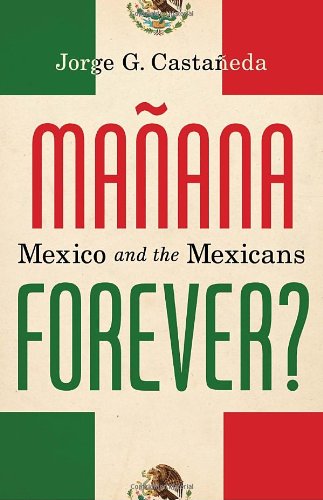
Manana Forever?
کتاب های مرتبط
- اطلاعات
- نقد و بررسی
- دیدگاه کاربران
نقد و بررسی

April 15, 2011
A distinguished scholar charts the many contradictions that shape and afflict Mexico.
After 500 years of authoritarian rule, Mexico has a burgeoning middle class and a functioning, if creaky, representative democracy, but its civil society remains perilously weak. Indeed, Castaneda (Politics and Latin American Studies/New York Univ.; Ex Mex: From Migrants to Immigrants, 2008, etc.) argues, the very cultural traits which may have permitted the people to survive their tortured history now serve to obstruct progress and stand in the way of Mexico's full entry into modernity. He identifies a number of these characteristic features, explains their origins and the consequences they have wrought and discusses the hurdles they pose for the country's future. Mexico, he argues, is plagued by a valorization of the individual and a persistent mistrust of collective action, a penchant for embracing victimhood, a tendency to avoid conflict and confrontation, a mistrust of competition, an obsession with past oppression and betrayals, a tolerance of corruption, an exaltation of ritual over reality and a xenophobia embedded even in law. As he takes the measure of his native land, Castaneda relies on three sources of information: "the classics"—the best that has been written by knowledgeable observers of Mexico—an abundance of statistical information, and his considerable personal experience. The delivery of so much political, economic and sociological data, while a necessary component of his analysis, can sometimes make for slow going, and he frequently assumes a greater understanding of Mexico's recent politics than most Americans, at least, surely possess. Still, his anecdotes are lively, and he makes judicious use of the experts he frequently invokes. Perhaps Mexicans will heed Castaneda's prescription for reform, including, for example, instituting a national police force and criminal code and his call for a new respect for the rule of law. There's an underlying pessimism to his argument, but he can't help offering reasons for hope.
An informed, persuasive analysis of the attitudinal adjustments and concrete changes required for Mexico to thrive in the 21st century.
(COPYRIGHT (2011) KIRKUS REVIEWS/NIELSEN BUSINESS MEDIA, INC. ALL RIGHTS RESERVED.)

March 1, 2011
Global Distinguished Professor of Politics and Latin American Studies at New York University, Castaneda gives us a state-of-the-nation view of Mexico, covering the puzzling tendency to violence, conflicted relationship with the United States, and contradictory impulses regarding outsiders and fellow citizens alike. Serious reading, not for your quick trip across the border; with a five-city tour.
Copyright 2011 Library Journal, LLC Used with permission.

May 15, 2011
Mexico, poised somewhere between developing nation and developed liberal democracy, and the obstacles to its advancement into modernity occupy the nations former foreign minister in this analytic work. Venturing on the slightly perilous topic of national character, Castaeda considers half a dozen traits of Mexican society within the context of Mexican history, how they have evolved as revealed by opinion surveys, and what dynamism in these traits portends for Mexicos future. Seasoning the presentation with his own experiences and ruminations by Mexican writers, Castaeda identifies corruption and disregard for law as critical impediments to national economic development. Those problems he sees as emanating from such widespread attitudes as the propensities of Mexicans to view themselves and their country as victims and become obsessed with their history as such, an exaggerated individualism that stifles formation of civic organizations, and a psychic aversion to conflict in interpersonal relations and politics. Also touching hot-button issues like immigration and drug trafficking, this is a debate-stoking current events necessity for most collections.(Reprinted with permission of Booklist, copyright 2011, American Library Association.)

























دیدگاه کاربران